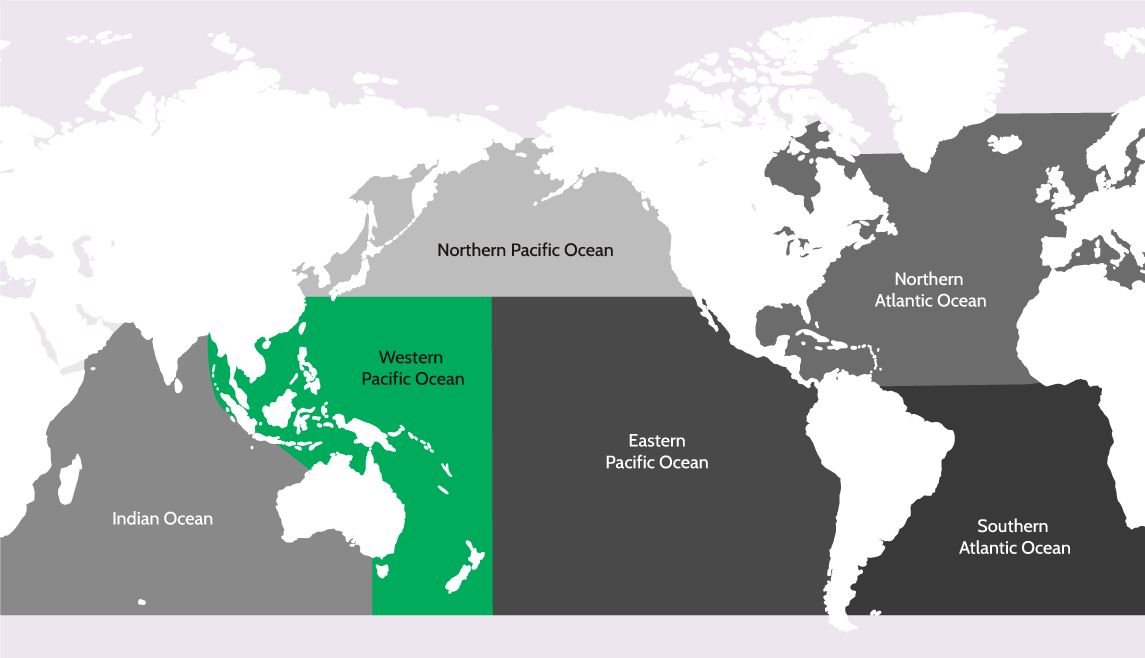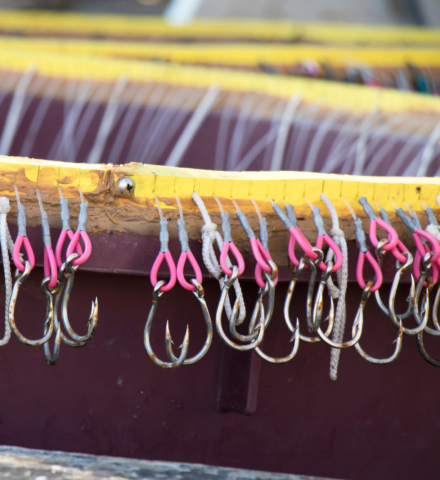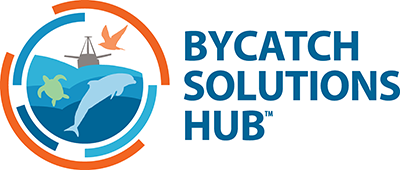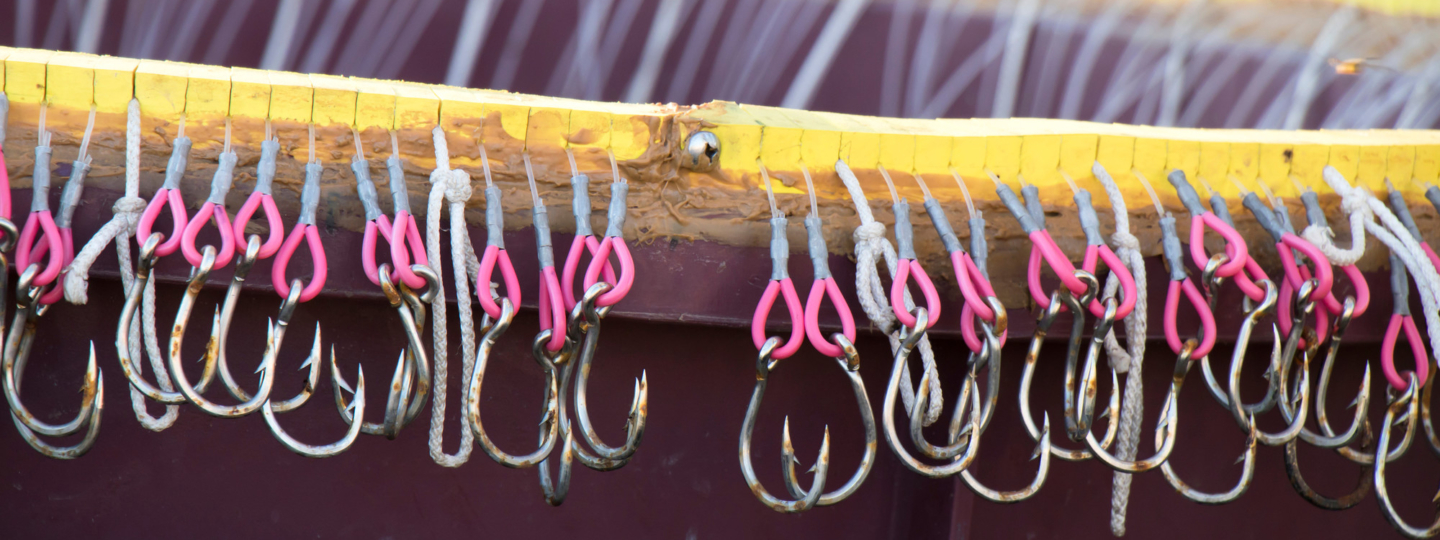Longline
Western Pacific Ocean
Longlines consist of hundreds to thousands of baited hooks that branch off a mainline that can be miles long. Depending on target species, longlines are deployed either in the open ocean (pelagic fisheries) or along the ocean bottom (benthic fisheries).


Target Species
Mahi
Swordfish
Tuna
Bycatch Species
Sea Turtles
Seabirds
Sharks and Rays
Solutions
View allFunding Opportunities
View allDescription
Albatrosses and other seabirds are facing a conservation crisis worldwide. Tuna fishing is a key threat, with tens of thousands of seabirds becoming hooked and drowning each year.
A new seabird-safe tuna hook (called the Procella hook) provides fishers with a simple way to reduce seabird deaths. This hook is weighted so it sinks quickly when the longline is being set. Seabirds have little time to grab the baited hook before it is below the depth they can dive to. Several prototypes of the Procella hook have been trialed in New Zealand by three leading tuna skippers. The fishers report excellent target catch and very low seabird captures with the finalized design. This self-reported feedback has been confirmed through government on-board cameras.
The next step is to manufacture the Procella hook and create interest and uptake by making the hook available to a broader group of skippers in the New Zealand tuna fleet and selected international tuna fleets. Target catch and fishing effort data from participating vessels will be used to produce scientific reports and marketing materials. The Procella design is easily adapted to a multitude of hook types and any hook factory can tailor the product to their customers’ needs.
The Procella hook is safer for crew than traditional line weighting options and has the advantage of making compliance checking simple and reliable. And most importantly, the skippers involved in the project have proven to themselves the Procella hook is good for fishing.
Want to know more? Contact SFP’s Bycatch Hub Manager for more specifics on the project workplan and a line-item budget.
Beneficiary: Southern Seabirds Trust
- To establish the seabird-safe Procella hook as market ready. $48,800 USD
Description
The Vietnam tuna handline/longline fishery primarily targets yellowfin tuna but also includes commercial catch of bigeye tuna, swordfish, blue marlin, striped marlin and wahoo from the western and central Pacific Ocean. During the FIP pre-assessment, they also documented bycatch interactions with sharks, rays, and sea turtles that get caught on the baited hooks.
Working with the Vietnamese fisheries association VINATUNA and FIP manager Sea Delight, this funding opportunity will reduce bycatch impacts on sharks, rays and sea turtles utilizing a comprehensive approach. This project will support best handling and release training workshops for 240 vessel captains and bycatch monitoring workshops for 40 port observers, expansion of the newly initiated at sea monitoring devices (COPPA), distribution of 1-year of circle hooks for 250 vessels (recognized best practice), and the printing and posting of Western Pacific Ocean Key Species and Discard Release posters on vessels and at major landing ports.
Trainings for both vessel captains and portside observers, informational posters, and expansion of the COPPA program will have long-term impacts on bycatch reduction in the fishery while circle hooks will immediately reduce bycatch rates for sharks, rays, and sea turtles. Additional support to provide a second year of circle hooks is possible and recommended.
Click "I'm Interested" to contact the Bycatch Solutions Hub for more details.
Beneficiary: VINATUNA
- Comprehensive Bycatch Reduction Project $51,127 USD
- Additional Year of Circle Hooks $12,570 USD
Description
In California, Experimental Fishing Permits (EFP’s) have been granted to several fishing for swordfish and bluefin tuna using sustainable deep-set buoy gear (DSBG). Since 2023, DSBG has been a low-bycatch alternative to traditional swordfish gear, such as pelagic longlines and drifting gillnets, which can negatively impact sea turtles, sharks and seabirds. DSBG reduces bycatch by setting beneath the thermocline, where non-targeted species are uncommon. However, it can be challenging for fishers to relocate their DSBG, and losing gear is a concern with inclement weather. Lost gear can become ghost gear, which could indiscriminately fish both target and non-target species. Blue Ocean Gear provides Smart Buoy technology for tracking and monitoring deployed gear. In 2023, with funding from Santa Monica Seafood and support from SFP, 2 DSBG vessels were provided with Smart Buoys to track their gear. All DSBG were successfully relocated, and Smart Buoys enabled more effective day-to-day operations for the fishers.
Based on this success, this project will be expanded to include outfitting two additional DSBG vessels with Smart Buoy technology. The expansion will also include training for fishers and a satellite data plan for an additional vessel already equipped with Smart Buoys. The initial training and ongoing support will be conducted by Blue Ocean Gear, both in-person and virtually, as successfully done during the past project. The additional hardware will include 10 Smart Buoys and 1 Wireless Charger per vessel. The software plan includes the Iridium subscription per buoy, as well as access to buoy data via the mobile app, web app, and TimeZero plotter.
Click "I'm Interested" to contact the Bycatch Solutions Hub for more details.
Beneficiary: Blue Ocean Gear
- Fully Outfit 2 DSBG Vessels-Funded $27,750 USD
- Fully Outfit 2 Additional DSBG Vessels plus Training and Satellite Plan $32,000 USD

